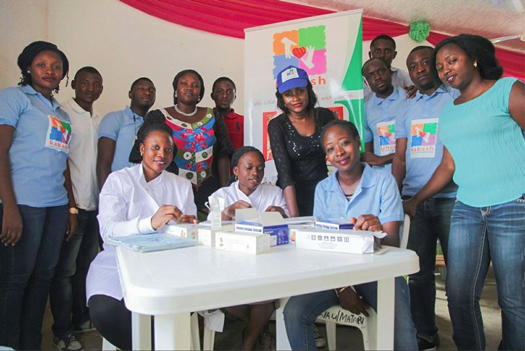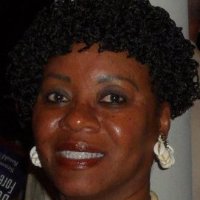African women talk about important issues
By Jehron Muhammad -Contributing Writer- | Last updated: Aug 30, 2017 - 1:06:21 PMWhat's your opinion on this article?

Kabash Love Foundation, a Nigeria-based organization which focuses on providing solutions to issues relating to maternal and child health. Photo: Kabash Love Foundation /Facebook
|
In many African countries due to limited pre-natal care during pregnancy, limited health facilities, and midwives, especially in rural areas, pregnancy can be a “death sentence.”
During a recent, on the record phone interview from Sudan, a female genital-mutilation victim described how she and her sister experienced this horrific practice. She said her sister nearly died from uncontrolled bleeding.

|
A lot of these societal maladies, including a high incidence of AIDs and illiteracy among women, happen because very young girls, because of traditional, religious, cultural and economic reasons, being encouraged, are getting married.
But the issue that most concerned African women, who participated in a roundtable discussion at the University of Delaware campus, was domestic violence.
The 11 professional women, from at least eight African countries, said domestic violence topped their list.
Dr. Tahiya McCoy Nyahuma, of Philadelphia, declared “the issue of women and violence” was most pressing.

Dr. Tahiya McCoy Nyahuma
|
“The issue of ending violence against women really transcends borders and transcends national governments and national public policy. It’s a global … issue,” she said.
The issue of violence against women in Africa has become so normalized, it’s not even an issue, she added.
“Women don’t see it as an issue because they have been so violated from childhood from watching their mothers, their grandmothers.”
Attorney Katumi Mohammed Oboirien, principal partner of Al-Naseerah Chambers and founder of the Al-Naseerah Legal Clinic in Nigeria, said, “Most of these women suffer in violence because as Muslim women … these women are going through difficulties in their home. They (Muslim community) tend to see us … in the background … they have no one to speak up for them.”
When it comes to fighting against domestic violence, Ms. Oboiren, who is also a member of the Federation of International Women, said her “lawyer’s office … tends to institute actions against their (abusive) husbands.”
And, she added, in “Kano State” domestic violence results in a high-divorce rate. But, at the same time divorces are difficult. “For them to hire private lawyers is very expensive, so basically they feel, they have no hope.”
Ms. Oboiren is an attorney with the Prisoners’ Rehabilitation and Welfare Action and Legal Aids Council of Nigeria with seven years of experience doing pro-bono work. She “has taken it upon myself to represent (women) for free.”
She said when women seek the services of her firms, “we initiate actions and give options.”
“If she is ready to leave the marriage, we set them up with NGOs (Non-Government Organizations) and provide training in a trade or skill so she can provide for her family and take care of her children.”
Emilia Ndinelago Nambahu is a life skills coach and monitoring and evaluation officer for the Namibia-based Star for Life organization. “We have experienced something called ‘passion killing,’ ” said Ms. Nambahu.
It’s mainly when “a boyfriend kills his girlfriend. And it’s gone viral,” she said, blaming the exponential growth in passion killings on the media. “In the sense that these stories are being narrated very well” the media is a problem, she said.
In fact, when you google passion killings in Namibia, you receive 548,000 results. On the website sisternamibia.com there are 85 links to articles involving passion killings, including an incident where a woman bailed her boyfriend out of jail, they had an argument and he killed her. In a country the size of South Africa, with only 2.5 million citizens, the high incidence of what is also called “intimate partner homicides” makes this growing societal malady particularly troublesome.
The online publication AnswersAfrica describes Namibia as “a country where men are expected to have and demonstrate their control over their women.”
In a 2013 health survey, 40 percent of Namibian men and 35 percent of women believed it okay to hit your wife or partner for things like “burning the food,” going out without permission or refusing sex.
AnswersAfrica also attributed these “toxic relationships” to its poorest Black citizens having to grapple with a traumatic and violent apartheid past that saw most denied an education.
In a country that is only six percent White and nearly 88 percent Black, the publication, used only photos of two apparently physically brutalized White women.
Not all the roundtable discussion focused on societal maladies. These young African professional females were in the U.S. as members of the President Obama-created Nelson Mandela Young African Leaders Initiative (YALI).
According to Keturah Adams, who has over six years experience in community development, specializing in community healthcare interventions and developing women empowerment programs, “We are here as part of a summer program. We’re here to learn civic leadership. We are all from different countries doing different things and we’re here to be empowered, to be connected, to be able to do more when we return back home.”
Ms. Adams is not only a healthcare specialist, she is the founder of the Kabash Love Foundation, a Nigeria-based organization which focuses on providing solutions to issues relating to maternal and child health. Her intervention programs have to date reached over 10,000 mothers and children.
She recalled, “when I was in labor feeling so vulnerable” she literally was in “shock as to what was going to happen, thinking, did I go through nine months only to not make it (die)?”
She also thought, “What would happen to the child?”
“Thank God, I was in a very good hospital … and the child came out fine and safe,” she said.
Her nonprofit grew out of her concern for those women living in rural areas without pre-natal care or assistance from a health care professional or midwife.
She got to thinking “about women in rural communities … who don’t have basic access to health care.” One in every 30 Nigerian mothers die in childbirth compared with one in every 30,000 in Sweden. From research she discovered that every year many women in Nigeria die “from complications during pregnancy and 95,000 children die annually from infections after child birth.”
Every year six million births occur with the assistance of “a traditional birth attendant,” who she said is just “a regular woman in the community,” with no actual health related training, she explained.
In some cases mothers are alone when giving birth. “Sometimes they are alone because the cultures and traditions in Nigeria say that a woman should give birth alone,” she added.
She said her organization overcomes “barriers and “traditions” that “hinder women from using health facilities.” Her organization goes into rural areas and find these “traditional birth attendants” and “train them, empower them and teach them the best practices.”
Her organization “produced our own maturity kits, which contains every essential the women need from time women goes into labor and the point the baby comes out.”
Vicensia Fuka, an attorney, media expert and activist, has eight years of advocating for freedom of expression and media independence in Tanzania.
Women in rural areas of her country cannot sit in a public place, “where there are men and speak,” she said. So women, grow up, even when they have something to say, or are encouraged to speak, “find it hard to speak their minds.”
Ms. Fuka, a senior program officer at the Fellowships and Strategic Partnership Projects Program at Tanzania Media Foundation, also stressed the importance of a free press.
She said Tanzania is plagued with the same issues as other African states, but feels an active and involved free press “can act as a watchdog of government stories that will trigger accountability (and provide) information that can be used to debate current issues.”
What TMF does is “build capacity in terms of giving grants to journalists and media houses,” she said.
If media outlets can’t “reach to villages, we give (them) funds to reach there. We want the voices of women villagers, the voices of young people in the villages to be heard,” she said.
INSIDE STORIES AND REVIEWS
-
-
About Harriett ... and the Negro Hollywood Road Show
By Rabiah Muhammad, Guest Columnist » Full Story -
Skepticism greets Jay-Z, NFL talk of inspiring change
By Bryan 18X Crawford and Richard B. Muhammad The Final Call Newspaper @TheFinalCall » Full Story -
The painful problem of Black girls and suicide
By Charlene Muhammad -National Correspondent- » Full Story -
Exploitation of Innocence - Report: Perceptions, policies hurting Black girls
By Charlene Muhammad -National Correspondent- » Full Story -
Big Ballin: Big ideas fuel a father’s Big Baller Brand and brash business sense
By Bryan Crawford -Contributing Writer- » Full Story






 Click Here Stay Connected!
Click Here Stay Connected!








